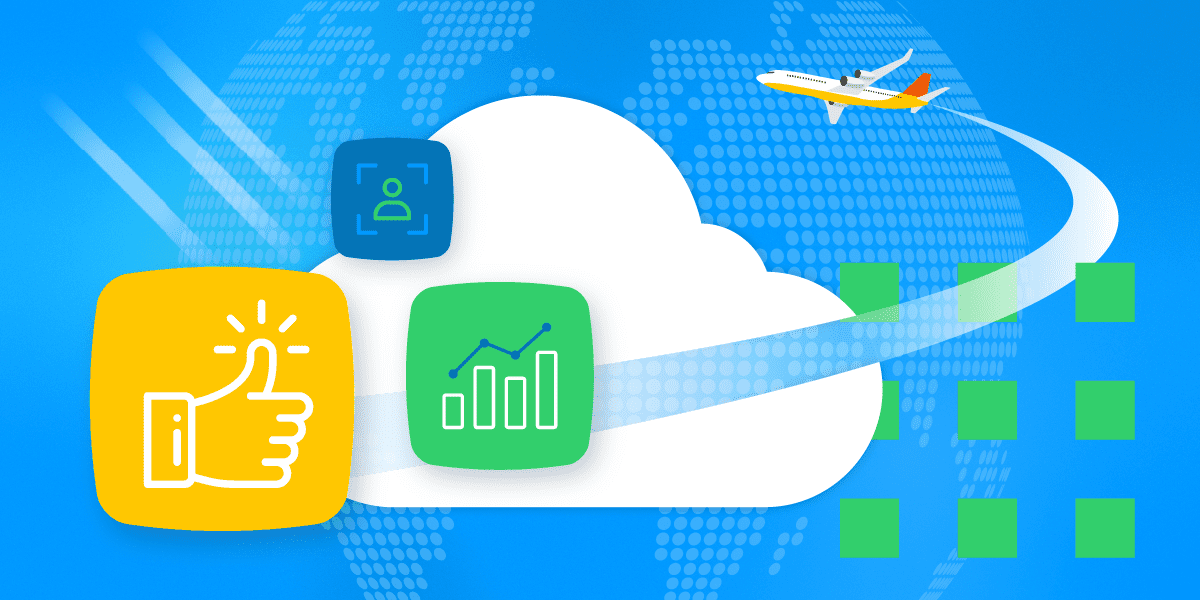How to Improve Traveler Satisfaction Using Cloud Computing Solutions

Customer service is the key metric that underpins the overarching success of travel and hospitality brands. In fact, 60% of customers claim that great customer service is critical to their travel purchase decisions.
Cloud computing solutions, such as voice and contact center software, help global brands offer excellent customer service around the world. With travel and hotel cloud technology’s expanded voice coverage and robust phone features, your teams can easily improve satisfaction and customer retention through convenient, comfortable and personalized traveler journeys.
Focusing on servicing the customers is going to get your company where you want to be– and cloud computing solutions for travel can get you there. Below are five tips to improve your guests’ experiences and satisfaction.
1. Use speed and agility to deliver convenience and comfort
A primary reason to move your hospitality PBX to the cloud is that cloud computing solutions can use speed and agility to deliver convenience and comfort to travelers through quick and easily accessible information and services. This is possible because software cloud service tools are simple to set up and provide robust features to support your customers’ needs now and in the future.
Some immediate benefits of investing in cloud computing solutions include:
→ Help customers navigate to get answers:
Nothing’s more stressful to a traveler than having an issue arise right before or during a trip and not being able to get answers. With travel IVR software and flexible call distribution, you can automate FAQs and set up concise menu options to direct customers to the agent or staff member who’s best equipped to solve the customer’s issue.
→ Supply customers with a reliable connection:
Working with a VoIP provider with a high Mean Opinion Score (MOS) and excellent call quality will help to ensure that no matter where your call center teams are located, your guests’ calls aren’t dropped along the way. Additionally, hospitality communications providers often have multiple geographic data centers around the world to ensure network stability and superior call quality for business continuity.
→ Collaborate efficiently among teams:
Team alignment and collaboration are key to delivering optimal customer service. Cloud computing software also offers additional and extensive CX call features that help your teams communicate effectively, provide quality service and exceed benchmarks. A few ways it can help achieve these include:
-
- Get customers to the right staff: Gives your teams visibility into call flow navigation. By optimizing flows, your teams can achieve more first-touch resolution when travelers are routed to the right place the first time.
- Ramp up & provide ongoing training: With call coaching tools, your customer experience managers get a closer look at daily interactions, can ramp up training time, and even enter the conversation to help assist guests when necessary.
- Don’t make guests wait: Features like queue callback help your agent teams reduce hold times while allowing your guests to get serviced once an agent is available, without the frustration of waiting on hold.
2. Cultivate loyalty through hyper-personalization
Travelers don’t just want personalization– they expect it. Accenture reports a whopping 91% of consumers believe companies offering relevant and personalized recommendations impact their buying decisions. Consider the following to do just that:
→ Offer customers travel suggestions or offers based on their past data:
The ability to track your customer’s previous transactions and offer suggestions they are more likely to act on is like striking gold– it’s invaluable. Predictive analytics allows you to do just that, and it’s made possible through cloud computing solutions. When you can offer experiences you know your customer enjoys, you’re much more likely to gain long-term business from them.
→ Integrate your hotel PBX with your revenue and customer-relationship management (CRM) tools:
Customer data is your greatest asset when it comes to personalization. To gather accurate data, you need to integrate your CRM, sales tools, and other data-tracking tools into your call center software. This way, every interaction made with a customer can be tracked and utilized to create personalized experiences.
→ Show your most loyal customers they’re high priority:
Simply put, loyal customers make you more money and cost less to keep than acquiring new ones. In fact, a 5% increase in customer retention can more than double your revenue. Keep your most loyal customers happy by reducing call wait times and improving their customer service experience.
Priority routing and skills-based routing allow you to get your VIP customers on the phone with an agent quickly, and also direct them to the ones best equipped to handle their issues as efficiently as possible. Both of these options are available through the top cloud VoIP service providers for travel and hotel brands.
3. Create a frictionless journey
The logistics of traveling can become stressful for customers. From acquiring visas and passports…getting stuck in traffic on the way to the airport…or sitting in long TSA queues, travelers can quickly become overwhelmed. That’s why being the hospitality brand with a frictionless journey for travelers and guests is a surefire way to win their loyalty for the long haul.
→ Provide contactless experiences:
The simplest, most direct way customers access data is through their mobile devices. Apps designed for mobile-direct booking and guest services enable travelers to access important information like flight and hotel reservation times, upgrade options, and additional add-on experiences. Even better, your cloud voice providers can automate SMS alerts and notifications so your customers never miss an update.
4. Keep communication channels open
Through cloud innovations in recent years, customers expect the ability to communicate with businesses 24/7. Keeping your communication channels open at all times is nearly a requirement to compete in today’s digital landscape.
Multiple types of channels you should consider keeping open include:
→ Voice channels
Phone service is a legacy channel, and it’s still a preferred method of communication for customers. Speaking directly to an agent can be done through…
-
- Phone Calls: Direct dial to customer service lines or agent-returned calls on landlines, mobile or webphones.
- Voice SMS: Agents can send an automated call that contains a recorded message.
→ Non-Voice channels
Businesses now have additional opportunities to communicate with customers through…
-
- Chat: Responding to customers by typing a response via website chatbots or live agents on a chat system through call center software.
- SMS Messaging: Texting updates and information to customers via phone number or app.
- Email: Automatically sending reservation information, boarding information, check-in/check-out statuses and more.
- Social media: Sending messages manually or automatically to customers’ social channels like Instagram, Facebook or Twitter to name a few.
5. Protect guests’ personal information
Now more than ever, consumer data is at risk of being compromised. As your customers are trusting you with their personal information, you must do everything in your power to secure your VoIP communications if you want to keep customer satisfaction high. There are two ways you can protect your guests’ personal information:
→ Ensure cybersecurity measures are in place to protect customer data:
Cloud communication providers enable protected server storage through multiple data loss prevention strategies, including encryption and Session Initiation Protocol (SIP). Three common SIP protocols include:
-
-
Transport Layer Security (TLS): TLS provides users with reliable messaging and voice delivery through the internet, delivering packets in a specific order. This is considered one of the most reliable packet delivery styles.
-
User Datagram Protocol (UDP): UDP delivers excellent user speeds and is typically the default layer for VoIP applications. This protocol transports media and voice messages using only essential requirements to help increase the speed of delivery between hosts.
-
Transport Control Protocol (TCP): TCP offers a reliable packet delivery in relevant order through voice and messaging across the Internet. This is considered the most reliable of all three SIP protocols.
-
→ Follow common compliance practices and work with compliant providers:
A common practice to ensure business security compliance is ongoing agent training using compliant-ready phone tools like call recording and monitoring for quality assurance.
Additionally, the phone calls your travel and hospitality business receives should have end-to-end encryption to keep interactions you share private and secure, from one endpoint (your customer’s phone) to another (your phone). If compromised or intercepted, it will become illegible in transit, providing an extra layer of protection.
Don’t forget to consider how compliant your VoIP provider is when reviewing your provider options. They should be compliant with government regulations like GDPR and PCI-DSS, so you can rest assured your customers are protected– and avoid some nasty legal indications.
Transform Your Hospitality Communications with a Reliable VoIP Solution
Improving your travelers’ experience will naturally translate to improved customer satisfaction, higher retention and increased revenue. Using a reliable VoIP provider can help you reach those satisfaction goals efficiently and securely to keep your customers happy— and keep your business flourishing in low and peak travel seasons.
Learn more about emerging trends in the travel and hospitality industry and how they’ll shape the customer experience in the future.
For immediate satisfaction improvements, give your travel customers that 5-star experience they’re expecting with AVOXI’s cloud-based hospitality communications solution.
2023 Global Cloud Communications Outlook
Lift up the guest experience
Emerging trends are shaping guest experiences and business growth. Get your report to see how you can amplify CX and voice services worldwide.

